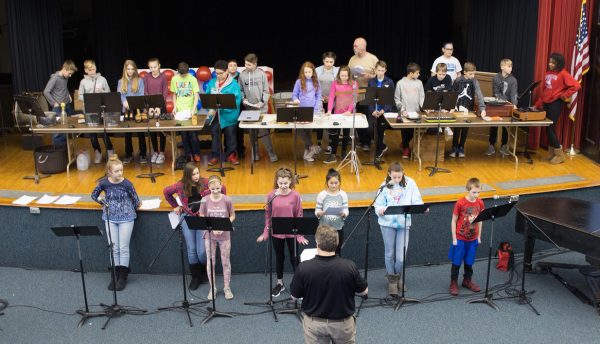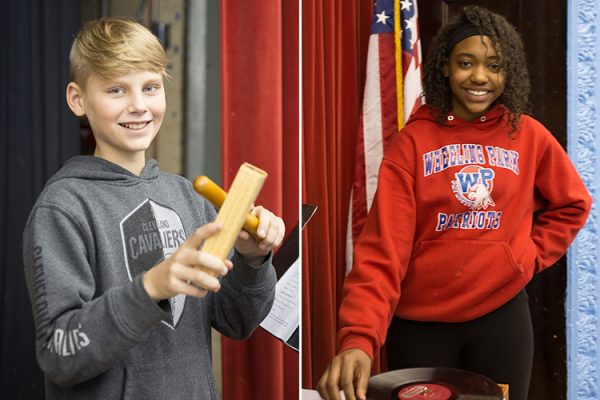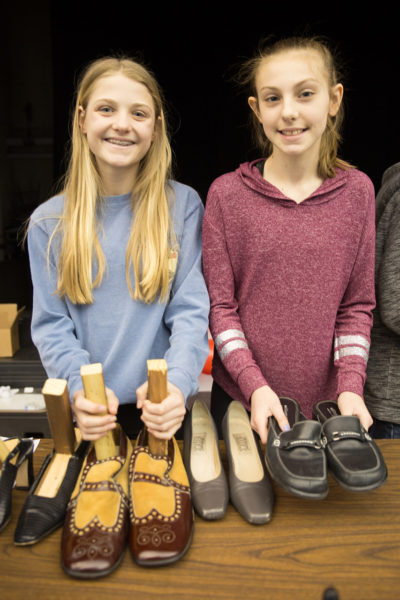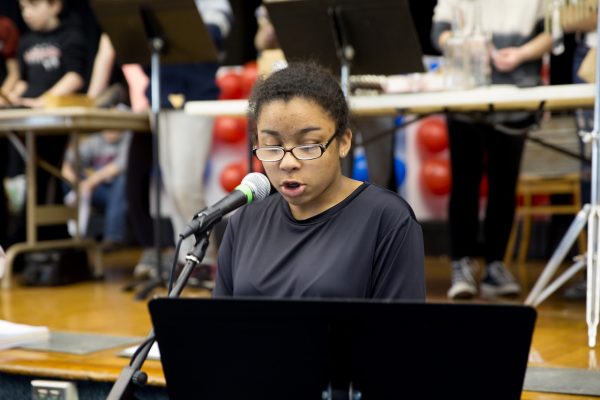Everyone loves a good story. Stories transport us to different worlds, enrich our lives, allow us to step out of our own shoes, tap into our imaginations and engage our emotions. But storytelling provides more than just a pleasurable pastime. Research indicates that stories have profound effects on how we learn, comprehend and retain information.
When we hear data and facts, the language parts of our brain work alone to decode the words into meaning. However, when the same information is conveyed through storytelling, other parts of the brain are activated. Stories more fully engage the brain. As a result, we understand more deeply and retain information longer.

A recent project-based educational program — Bricolage’s Midnight Radio Jr., presented by Oglebay Institute and Triadelphia Middle School — uses storytelling as a means of teaching core social studies curriculum on World War II.
Sixth-grade students researched, wrote and performed an original 1940s radio show, complete with Foley sound effects, live music accompaniment and commercials about products from the time period. The project culminated in a final performance for the entire student body, parents, teachers and administrators.

Oglebay Institute director of performing arts Tim Thompson, along with a team of teaching artists, technicians and playwrights, collaborated with Triadelphia social studies teacher Brad Sorge and school administrators to implement the project.
The program was a spinoff of the Midnight Radio educational residency program created and successfully implemented by the Bricolage Production Company in school districts throughout western Pennsylvania. A grant from the Claude Worthington Benedum Foundation allowed Oglebay Institute to pilot this program in West Virginia.
Thompson said this type of alternative learning fuses “content knowledge with creativity, communication and collaboration” to tie facts together into a more meaningful pattern. Plus, it gets the kids excited about learning.
“When learning feels like playing, the students are more engaged. Discovering and creating things on their own makes the content seem more interesting and connects students in a more personal way to what they are learning.”
During social studies classes, Sorge encouraged and directed the students as they researched and brainstormed ideas for the plays based on general topics and from World War II such as the Great Depression, Hitler’s rise to power, the home front war effort and others. They came up with titles and general storylines, developed character names and personalities and wrote drafts. Then, professional playwrights Gab Cody and Jeremy Richter transformed the students’ stories into workable scripts.
Richter helped students develop commercials and jingles appropriate for the time period. Kids worked with Thompson for acting class, learning how to use the voice, body and mind in the development of a character, and how to listen for cues and stay focused. Towngate technical director P.D. Gregg and artistic director Dave Henderson worked with students in science class using Foley artistry (the 100-year-old practice of sound-effect construction using physical props) to teach the science of sound — how it is produced and reaches our ears, characteristics of sound waves and how different kinds of objects produce sound.
They used drills, bells, whistles, drums, wind machines and all sorts of props to create sound effects for the plays. Shoes on wooden boards created footsteps. Popping balloons sounded like gunshots. Scratching sandpaper sounded like the striking of a match.

Gregg said student enthusiasm for the Foley lessons was infectious. “They loved experimenting with sound. You would have thought it was recess.”
The entire process led to the creation and performance of six original radio dramas, each on a different topic and told from a different perspective. Along the way, students learned about history, geography and vocabulary as well as the political and economic climate and social and cultural influences of the WWII era.
“Go Ever So Quietly, and Softly Pray” tells about the tragedy of the USS Indianapolis Navy ship, which was torpedoed and sunk in 1945 in the South Pacific. Of the nearly 1,200 men on board, only 317 survived five grueling days at sea before being rescued. One of the survivors was Wheeling resident Paul McGinnis who graduated from Triadelphia High School (now the middle school) and walked the same halls as the students who were now telling his story through their original radio play.
In “La Dame Qui Boite,” students presented the story of Virginia Hall, an American spy during WWII, who was considered by the Gestapo to be the most dangerous of all Allied spies. In the comedy “Mafia Goes Bankrupt,” booze smugglers turn into do-gooders in the midst of the Great Depression. “Tuskegee Flight 101” pays tribute to the Tuskegee Airmen, the first black military aviators in the U.S. Army Air Corps and illustrates the strong bonds of friendship formed during combat. Life on the home front is the setting for “War of Gifts,” which highlights women’s contributions to the war effort. In “The Hanukkah Disaster,” a Jewish family leaves Poland after Hitler’s invasion, leaving behind everyone and everything they have ever known.

Through stories like this, Thompson said, students made personal connections to the past. “Theater teaches empathy. It allows us to put ourselves in another person’s shoes and relate to their thoughts and feelings. The plays gave context to the historical information and allowed students to move from knowing something to understanding it.”
Thompson is incredibly proud of “the amazing, creative and fearless sixth-grade students” and grateful to the faculty, staff and administrators at Triadelphia Middle School for embracing this project.
While the final performance was met with applause and cheers from the audience, Thompson says the process was just as important as the performance.
“It was a collaborative journey of discovery, exploration and creative thinking. And when you teach kids to think creatively, they can learn anything.”
• Misty Klug is director of marketing and communication for Oglebay Institute. An advocate for the arts, board game geek and wannabe comedian, she questions everything and always roots for the underdog. She lives in Shadyside with her husband Joe and their dogs — Henry, Norman and Lucy. Now empty nesters, their passions include renovating homes, traveling, engaging with old and new friends, and porch sitting.


